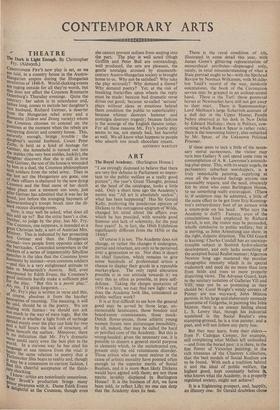CONTEMPORARY ARTS
THEATRE
The Dark is Light Enough. By Christopher Fry. (Aldwych.) CHRISTOPHER FRY'S new play is set, so we are told, in a country house in the Austro- Hungarian empire during the Hungarian revolution of 1848-9. World-shaking events
this raging outside for all they're worth, but inks does not affect the Countess Rosmarin
Ostenburg's Thursday evenings. Quite the contrary: her salon is in attendance and, before long, comes to include her daughter's 9rs1 husband, Richard Gettner, a deserter Romantic the Hungarian rebel army and a ADmantic (Sturm and Drang variety) whom the Countess chooses to conceal on the Premises at the moment when the rebels are occupying district and country house. This, naturally enough, brings trouble : the daughter's second husband, Count Peter Zichy, is held as a kind of hostage for Gettner, the household is turned out into the stables (the very best stables, luckily), the daughter discovers that she is still in love ,With Gettner, the son of the house is wounded by him in a duel, the Countess philosophises With soldiers from the rebel army. Then in the last act the Hungarians are gone, one Countess their officers is sheltered by the now dying %-ountess and the final scene of her death
takes place not a moment too soon, just after Gettner has admitted that it was her he Loved, just before the avenging bayonets of Dchwarzenburg's troops break into the ill- Used rococo drawing-room.
Now, it may well be asked, what does all
this, add u to p to? the critic hasn't a clue. aeither, judgeBut by the play, has Mr. Fry. The Countess, one supposes, is intended as a Mat Christian lady, a sort of Atistrian Mrs. Iginiver. This is indicated by her protecting 'rat Gettner and then the Hungarian c°, lonel—two people from opposite sides of the barricades. Concealed somewhere in the thickets of a series of impenetrably Sibylline speeches is the idea that the Countess loves humanity by instinct—even common soldiers --and this is a very enlightened attitude to take in Metternich's Austria. Still, even Interpreted by Edith Evans, the Countess's for the instincts hardly make a sufficient plot the play. "But this is a poetic play."
Yes. I'd quite forgotten. . . .
Mr. Fry's play is written in verse and this, ‘'L course, absolves it from the harsher pecessities of meaning. The meaning, it will be said, should be in the poetry. We are dealing with fantasy: we should not ask 100 much in the way of mere logic. But the question is whether a light froth of verbiage spread evenly over the play can hide for two Zrld a half hours the lack of structure, of Left beneath the surface. Moreover, there r no indication that Mr. Fry's dramatic _verse could carry even the best plot in the zorld. In a curious way he has sited his T1guage at one remove from the vital: it ;Tara the same relation to poetry that a ilechnieolor film bears to reality and, though finalaY be a concession to current fashion, I
.7‘i this cheerful acceptance of the third- • 4de shocking
teljnow: critics are notoriously censorious. ti;er 'Brook's production brings many nor pleasures with it. Dame Edith Evans delightful as the Countess, though even
she cannot prevent tedium from seeping into the part. The play is well acted (Hugh Griffith and Peter Bull are outstanding), well produced, the sets are pleasant, the gentle nostalgia aroused by nineteenth- century Austro-Hungarian society is brought home to us. Why not be satisfied? Why take the play seriously? Why demand a theme? Why demand poetry? Yet, at the risk of breaking butterflies upon wheels the reply must be made: because bad dramatic verse drives out good; because so-called 'serious' plays without ideas or emotions behind them condition the public to superficiality; because whimsy destroys humour and nostalgia destroys tragedy; because fashion is the scourge of the English theatre today. For all these reasons Mr. Fry's poetic play seems to me, not merely bad, but harmful as well. We all know what happens to people who absorb too much chocolate cream.
ANTHONY HARTLEY










































 Previous page
Previous page